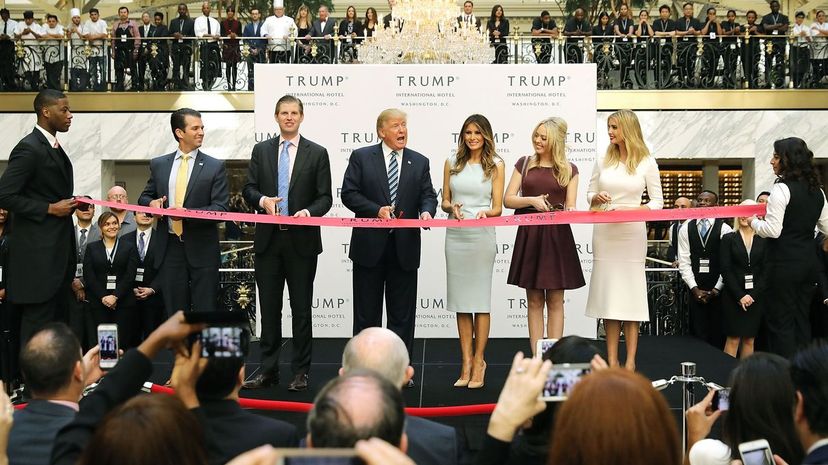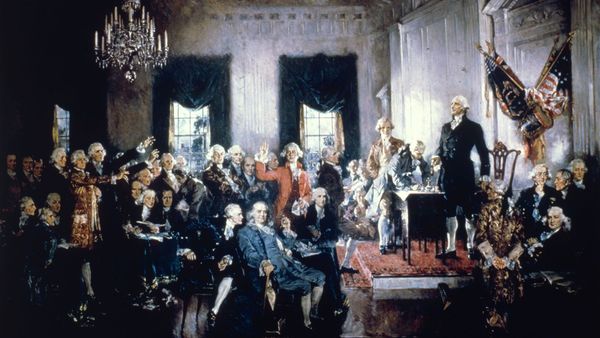
Everything about President-elect Donald J. Trump is, to use a favorite media term in conjunction with him, unprecedented. His underdog victory on Nov. 8 was unprecedented. His trigger-finger Tweeting style is unprecedented. But more than anything, his personal wealth, at an estimated $3.7 billion, is unprecedented for an elected official in the United States government.
Trump's sprawling real-estate empire includes high-end office buildings, luxury hotels and golf courses built with investment money from Russia, China and Germany. Glass-and-gold buildings bearing the Trump name stand in India, the Philippines, Panama, Uruguay and soon, Saudi Arabia.
Advertisement
Government transparency groups warn that Trump's complex global portfolio and cozy international business relationships create a singular potential for conflicts of interest.
"That's a huge problem," says Aaron Scherb, director of legislative affairs with Common Cause, a nonprofit that promotes accountable government. "Donald Trump, Jr. admitted that a lot of [his father's] projects are bankrolled by Russian enterprises. How will this impact his views on foreign policy toward Russia?"
Trump insists that he will turn over full control of the Trump Organization to his adult children and focus his attention on governing the U.S. But in typical precedent-busting style, he refuses to follow the 50-year presidential tradition of "building a wall" (wink) between his business interests and his presidential duties.
"The president can't have a conflict of interest," Trump recently told The New York Times. "In theory, I can be president of the United States and run my business 100 percent."
And he's absolutely right. According to the 1978 Ethics in Government Act, all high-ranking federal officials are required to disclose their financial holdings and recuse themselves from any government business in which they, their families or close associates have a financial interest. All federal officials, that is, except the president, the vice president, members of Congress and federal judges.
Even though the law doesn't require it, every president since Lyndon Johnson has chosen to either sell off all their investments before taking office or seal them in a blind trust to avoid even the appearance of profiting from the presidency.
What's a Blind Trust?
"When President Reagan took office, he liquidated all of his holdings and turned them over to a trusted financial professional," says Peter Bloom, a Washington D.C. attorney. "And once he liquidated his holdings and placed them into a blind trust, he had no idea what assets were being held inside the trust."
According to the rules of a blind trust, the owner of the assets can have no pre-existing personal or business relationship with the trustee. There can be no communication between the owner and the trustee. And the owner must have no idea what stocks, bonds and other investments are held in the trust. That last one's called the "no peeking" clause.
During the Republican primary debates, Trump said he would establish a type of "blind trust" in which his sons and daughters and his business executives would run the Trump Organization without his involvement.
"By definition, that's not a blind trust," says Scherb of Common Cause. "It's neither blind nor trustworthy."
Last week, Common Cause and a coalition of government transparency advocates sent a letter to President-elect Trump urging him to fully divest himself of any financial relationship with the Trump Organization and place all of his assets into a true blind trust.
"Should President-elect Trump turn over the management of his business interests to his three adult children while retaining ownership, those conflicts will not go away," the letter states. "In fact, such an arrangement could endanger the President-elect. As owner of the business, he would remain legally liable for any violations of the law by his businesses."
If the 45th president fails to legally separate himself from his company, not only could Trump face potential lawsuits like the one recently settled for $25 million against Trump University, but he might run afoul of a little-known constitutional clause.
The so-called emoluments clause in Section 1, Article 9 of the Constitution bars any federal office holder from receiving "emoluments" — compensation or pay for services — from foreign governments. Legal scholars say that any money President Trump earns from contracts with foreign governments could fall under this clause, especially if those earnings are far above the market value of the property.
And as Trump recently told a roomful of New York Times editors and reporters, his election has certainly been a boon for business.
"The brand is certainly a hotter brand than it was before. I can't help that, but I don't care," Trump said. "The only thing that matters to me is running our country."
If that's indeed Trump's sole priority, advocacy groups insist that he sell his share of the family business to his children or liquidate his holdings and put them in a truly blind trust. But for Trump to bend to this type of public pressure would be, once again, unprecedented.
Advertisement

